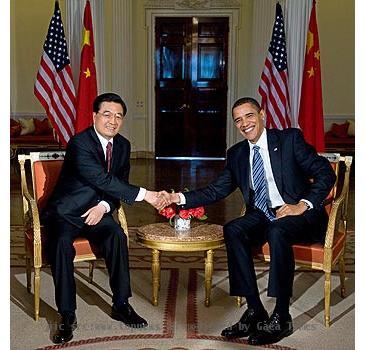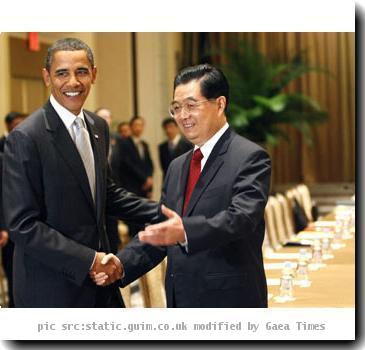China, Taiwan to sign trade deal that will tie their economies 6 decades since split
By Alexa Olesen, APMonday, June 28, 2010
China, Taiwan to sign trade pact tying 2 economies
BEIJING — China and Taiwan prepared Tuesday to sign a trade deal that binds their economies closer and that Beijing hopes could lead to political accommodation six decades after the rivals split amid civil war.
Taiwan hopes the tighter economic links will keep the island from being economically marginalized as China’s global clout grows. Beijing is granting Taiwanese products quick tariff reductions to show the benefits of closer ties.
The pact will end tariffs on hundreds of products traded across the strait and allow Taiwanese firms access to 11 service sectors on the mainland, including banking, accounting, insurance and hospitals. It should boost bilateral trade already totaling about $110 billion a year: some $80 billion in goods flowing to China, and $30 billion to Taiwan.
The deal will be signed in the southern Chinese city of Chongqing — a venue with an evocative history. Communist leader Mao Zedong and Nationalist President Chiang Kai-shek tried to negotiate a truce there after World War II — but failed. The two sides then resumed the civil war that ultimately saw Chiang’s government driven from the mainland to Taiwan in 1949.
For decades, relations across the 100-mile- (160-kilometer-) wide Taiwan Strait have been strained and remain a potential military flashpoint. China has 1,300 missiles aimed at Taiwanese targets and, while Taiwan has cut its defense budget as a proportion of GDP in the last two years, it retains a well-equipped air force as a deterrent.
Chen Yunlin, who oversaw negotiations for Beijing, met Tuesday morning with Chiang Pin-kung, chairman of Taiwan’s semiofficial Straits Exchange Foundation, ahead of the signing later in the day. A second agreement on intellectual property rights protection also is to be signed.
“This is a critical moment in the development of long-term relations. We should seize the opportunity to work together and build mutual trust,” Chiang said.
Chen called it an agreement of “equal consultation and mutual benefits.”
Formally known as the Economic Cooperation Framework Agreement, the pact marks a political victory for both governments. Chinese President Hu Jintao has sought to move beyond the threatening rhetoric that long characterized Beijing’s response to Taiwan’s refusal to unify with the mainland. His government has talked of ending the state of hostility with Taiwan and negotiating a peace treaty.
For Taiwan President Ma Ying-jeou, the deal is the high-point in the rapprochement that he has engineered since being elected two years ago on a platform to reduce tensions and strengthen economic ties. But Ma is under pressure to prove his strategy is working to Taiwan’s boisterous democracy and a divided public skeptical about Beijing’s intentions.
He told a group of generals Tuesday that the trade pact has been widely viewed as a “positive development within and outside the region.”
Ma assured the generals that Taiwan will not let down its military defenses but will pursue a smaller but more powerful arm forces.
Taiwan’s opposition Democratic Progressive Party has criticized Ma for proceeding without enough public input and rejecting calls for a public referendum on the agreement. There have also been street protests against the deal.
Still, polls show a majority of Taiwanese support the deal because of the economic boost it promises.
Notwithstanding years of political tension, Taiwanese businesses are already some of the most eager investors in China, having poured at least $83 billion into the mainland over the past two decades. About 40,000 Taiwanese companies now operate here.
Ma’s government says the deal will keep Taiwanese businesses competitive with Southeast Asian countries, whose free trade agreement with China came into force Jan. 1.
Analysts from the Peterson Institute for International Economics, a Washington think tank, project the deal could help Taiwan increase its GDP by up to 5.3 percent by 2020 and have described it as “an ambitious accord that fundamentally changes the game between Taiwan and China.”
____
Associated Press reporter Annie Huang in Taipei, Taiwan, contributed to this report.
Tags: Asia, Beijing, China, East Asia, Greater China, Hu Jintao, International Agreements, International Trade, Nationalism, Taipei, Taiwan

